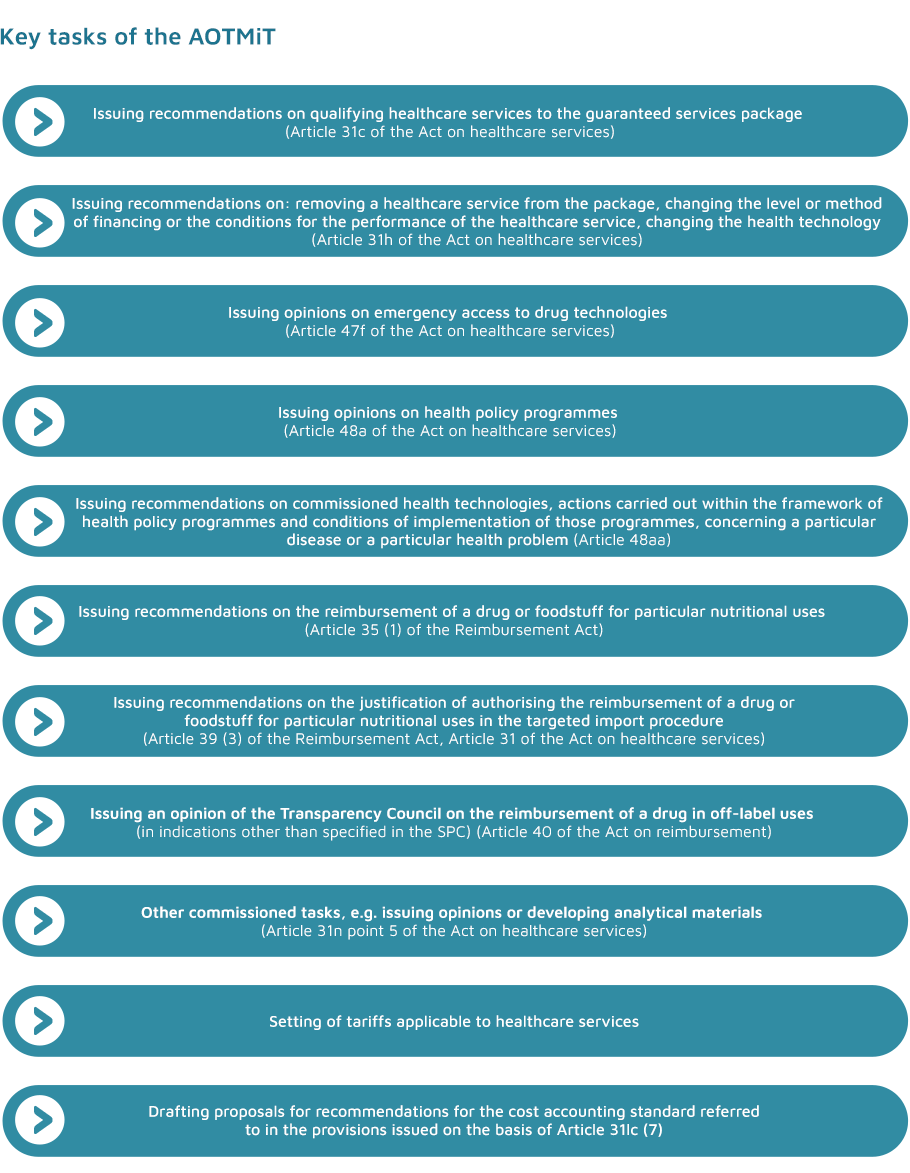What we do
The Agency for Health Technology Assessment and Tariff System is a consultative and advisory entity with legal personality, supervised by the Minister of Health.
The role of the Agency is to assist the Minister of Health in the decision-making process with regard to the financing of medicines and other technologies in the healthcare system.
To this end, health technology assessment (HTA) is used in a way which is:
- reproducible;
- transparent;
- within a specified methodological standard;
- evidence-based,
and provides the MoH with data and information supporting the process of making reimbursement decisions for the above-mentioned healthcare services and reduces the area of uncertainty related to these decisions.
The Agency has been pursuing this mission since 2005 by fulfilling the orders of the Minister of Health since 2008 on the basis of the following legal instruments:
- Act on healthcare services financed from public funds; and
- Act on the reimbursement of medicines, foodstuffs for particular nutritional uses and medical devices.
Historical background
The Agency for Health Technology Assessment was established on 16 September 2005 on the basis of the Ordinance of the Minister of Health of 1 September 2005 on the establishment of the Agency for Health Technology Assessment (Journal of Laws of 2005, No. 13 item 56), as a state budgetary entity subordinate to the minister responsible for health.
The Agency’s task was to assess medical procedures, with particular focus on medical procedures contracted by the NHF.
Pursuant to the Act of 25 June 2009 amending the Act on healthcare services financed from public funds and the Act on prices (Journal of Laws of 2009 No. 118, item 989), the Agency for Health Technology Assessment has obtained the status of a public entity with legal personality.
Pursuant to the Act of 22 July 2014 amending the Act on healthcare services financed from public funds of 1 January 2015, the Agency was entrusted with further tasks concerning setting tariffs for healthcare services.
An amendment to the Act resulted in the Agency for Health Technology Assessment changing its name to the Agency for Health Technology Assessment and Tariff System (AOTMiT). The organisational structure of the Agency has also been changed to reflect two main areas of activity: health technology assessment and setting tariffs for guaranteed healthcare services.
In June 2019, the amendment of the Act on healthcare services resulted in the Agency’s new statutory task concerning the initiation, support and conducting of analyses as well as research and development in the field of health technology assessment, tariff setting and assessment of basic requirements for the provision of healthcare services.
Successive amendments to the legal acts further expanded the scope of Agency’s tasks and powers within the two above-mentioned areas.
As of November 26, 2020, tasks related to the creation of a list of highly innovative drug technologies and a list of drug technologies with high clinical value were introduced. On the other hand, on May 26, 2022. The Agency was given the task of analyzing and preparing a report on changing the manner or level of financing of health care services, together with issuing a recommendation, in connection with the increase in the lowest salary. 2023 also brings new challenges for the Agency.
As of April 20, 2023, the Agency was given the responsibility to prepare proposals for key recommendations in oncology care, and to calculate a lump sum for serving as the National Monitoring Center and Provincial Monitoring Center. In November 2023, the Agency’s tasks were also expanded to include, among others: giving opinions on descriptions of Drug Programs, developing lists of OTC drugs, preparing a report on the evaluation of the effectiveness of TLI, and every 5 years reports on the evaluation of in-vitro procedures.



*Ladies and Gentlemen
We inform you that the materials and results of the discussions posted on the Agency’s website are the result of the conceptual work and analytical process carried out by the team of the Agency for Health Technology Assessment and Tariff System based on the EBM paradigm, including: search, selection, synthesis and interpretation of scientific evidence, or the data analysis carried out.
In connection with the above, we would like to inform you that the use of analytical material or the results of the discussion, in accordance with good practice, should be accompanied by information on the source in the form: [title of presentation / report], AOTMiT, Warsaw, June 2024]

